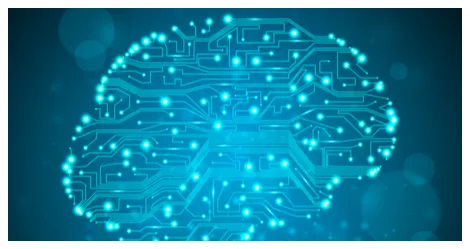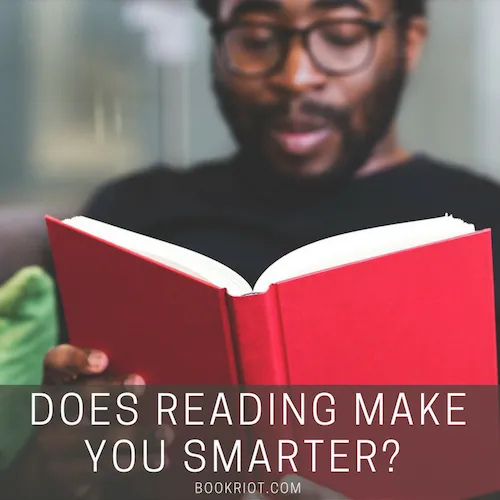
Does Reading Make You Smarter?
This content contains affiliate links. When you buy through these links, we may earn an affiliate commission.
We at Book Riot wax poetic about reading and how it makes a difference in our lives. But how does reading influence the brain? Does a book a day keep the neurologist (or Alzheimer’s) away? Can readers say that they used books to raise their IQ? Overall, does reading make you smarter? I go over all these questions in this post, but simply put, reading may make you smarter in some specific ways, especially when it comes to crystallized intelligence (what facts you know), fluid intelligence (how you identify patterns), emotional intelligence (your empathy), and your brain connectivity. Here’s how.


The History of IQ
Intelligence is a notoriously tricky characteristic to define. IQ, or the Intelligence Quotient, is perhaps the most common tool used to measure it. German psychologist William Stern developed IQ measurement in the early 1900s. His system uses scores from an intelligence test along with age to determine where an individual falls on the intelligence spectrum in comparison to other people. Intelligence, as it’s defined and measured in this test, is a combination of the abilities to problem solve, acquire new knowledge, and engage in abstract reasoning. Of course IQ does not perfectly measure intellectual ability. Culture, education, and other facets of a person’s history can alter how they respond to some questions on IQ tests. This means that people with the same innate or latent ability can potentially have different IQs and that some measurement bias exists in the test. When questions that cause this differential are identified, they are removed from the test, but if test creators have blind spots, those inevitably emerge in the test itself. A high score on an IQ test also relies on an individual’s motivation; wanting to do well on the test, and believing that the test matters, are correlated with higher scores. None of this answers the main question: can reading increase a person’s intelligence?What Reading Does To the Mind
It turns out that reading does alter the mind in myriad ways, not all of which emerge from IQ scores.Crystallized intelligence
At the most basic level, reading allows people to build their crystallized intelligence. Crystallized intelligence is all of the factual knowledge, the figures and data, that a person knows. “Book smarts,” to use the colloquial. The encyclopedia of the mind. As people read more, they add to their bank of information.Fluid Intelligence
Fluid intelligence is more abstract. It involves the ability to problem solve, detect patterns, and come to an overall understanding independently of crystallized intelligence. Reading and fluid intelligence have a reciprocal relationship; reading trains people’s brains to better detect more meaningful patterns and as people make these connections, they better understand what they read.Emotional Intelligence
This ability to make associations is also related to emotional intelligence. In 2013, two psychologists, David Comer Kidd and Emanuele Castano published a paper indicating that reading fiction improves an individual’s Theory of Mind. Theory of Mind is essentially a measurement of a person’s empathy and ability to understand how others think and feel. According to this study, people who read fiction are significantly better at identifying other people’s emotions because “the same psychological processes are used to navigate fiction and real relationships.” To quote author Derek Beres, “reading is a great way to practice being human.” Some of us could certainly use that practice.Brain Connectivity
But perhaps the most fascinating facet of how reading can make you smarter is the way it increases brain connectivity. Reading does not just engage with the parts of the brain that handle language; it also creates activity in portions that handle movement and sensation. When people read, a part of their mind steps into the body of the characters. That connection remains for a period after reading as well. In a study of undergraduates assigned to read the novel Pompeii by Robert Harris, researchers discovered that the links between the left temporal cortex, the brain’s language center, and central sulcus, the part of the brain that handles movement and physical feelings, remained enhanced. When you read, your body feels more.Does Reading Make you Smarter?
Ultimately it is useful to think of reading not in terms of whether or not it improves intelligence but rather in terms of how it changes the way the brain works. Reading may not be able to alter your baseline abilities, but it can increase what facts you know, allow you to better identify patterns, increase your empathy, and make your neurological connections more pervasive. All of this research on how reading influences the mind leaves us with hope. As a paper by Anne E. Cunningham and Keith E. Stanovich that looks at reading and children concludes:“Reading yields significant dividends for everyone—not just for the “smart kids” or the more able readers…We often despair of changing our students’ abilities, but there is at least one partially malleable habit that will itself develop abilities—reading!”
Reading may not be a magic pill to increase intelligence, but it can and does make a difference for people who pick up a book. What do you think? Does reading make you smarter?








